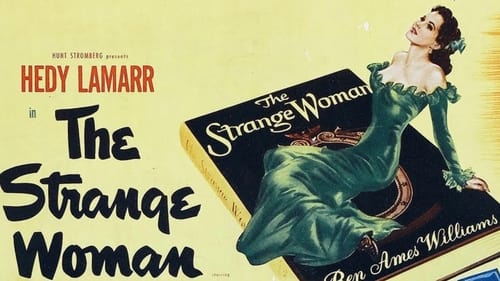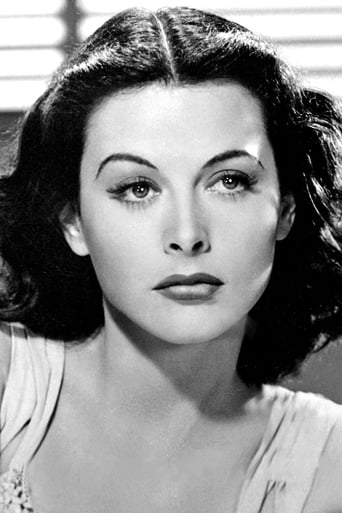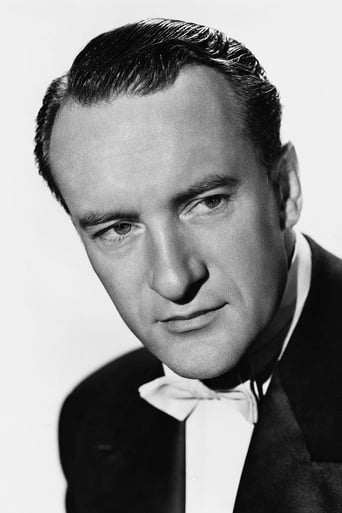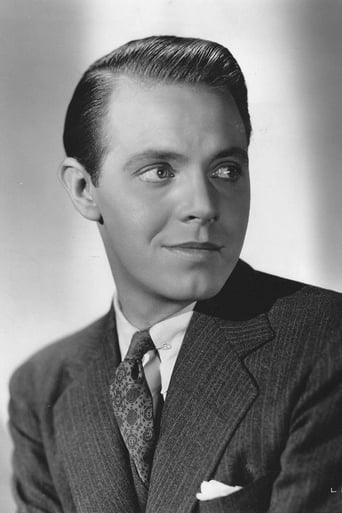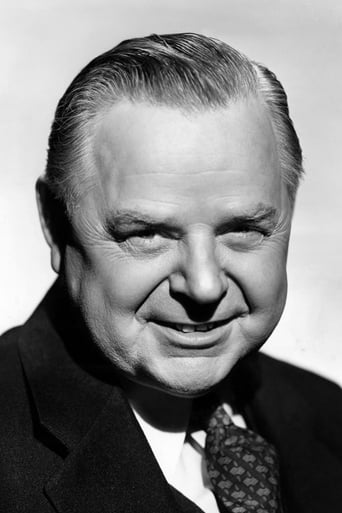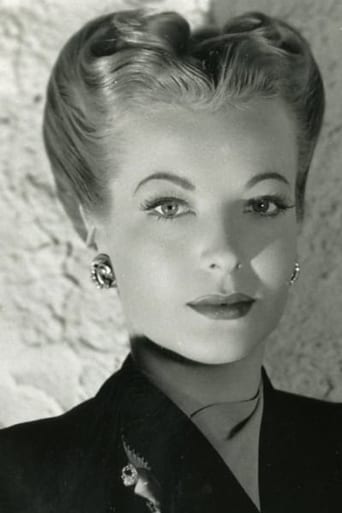VividSimon
Simply Perfect
Baseshment
I like movies that are aware of what they are selling... without [any] greater aspirations than to make people laugh and that's it.
CrawlerChunky
In truth, there is barely enough story here to make a film.
Fleur
Actress is magnificent and exudes a hypnotic screen presence in this affecting drama.
mark.waltz
Taking on the type of role that the equally exotic Margaret Lockwood played in exciting melodramas such as "The Wicked Lady" and "The Man in Grey", Hedy Lamarr gives one of her more interesting performances. She always looks great in period clothes, and is also aided by the very multi-dimensional character she plays. As a guttersnipe who marries older Gene Lockhart for position, she flirts openly with his son, then sets her corset and eyes on his mine manager. Lamarr never fully makes this character totally evil, giving her obvious compassion towards the sick, even volunteering a large donation to the local church which suddenly opens up the wallets of the tightwad rich parishioners who at first snubbed her. But with muscular bucks coming down from the mines, you know its only a matter of time before her lustiness returns Joining in on the action are Louis Hayward as Lockhart's black sheep son and George Sanders as the possibly amoral henchman who can't resist Lamarr's sultry stares. They play, respectively, the same parts that Stewart Granger and James Mason would play opposite Lockwood. Technically, the film is beautiful to look at, but it has the tendency to overdo the dramatic music in the love scenes. This will probably increase in popularity as the cult fans of director Edgar G. Ulmer increases.
christopher-underwood
Clearly hampered to some extent by the Hays Code, this is still a pretty eventful melodrama starring Hedy Lamarr as a scheming little vixen, ever, it seems on the look out for a more handsome or more wealthy gentleman. Gene Lockhart is excellent as her older first husband but George sanders seems all wrong just doing his thing as her final beau. Much twisting and turning here as Hedy's character breaks all the local rules yet still manages to acquire power and influence. Begins as if it is set to be a simple tragic tale as the daughter of a drunk seeks some rich guy to see her safe and then becomes more of a trail of vengeance on polite society before buckling under the code restrictions and pulling itself back from what might have been a delirious ending.
e_tucker
It's a very pleasant surprise to find that not only could Lamarr act but that she could handle a role of some complexity. Jenny, like Scarlett, is a villainess that I am inclined to root for even as she puts her evil plots into play - and that she could pull that off is really down to the acting. If Jenny behaves badly, Ulmer makes is clear that she certainly has her reasons; abandoned by a feckless mother and beaten and abused by a drunken father, and condemned to eke out her existence in poverty on the wrong side of the tracks as her betters look down on her. As a female with no opportunity to improve her lot, the best escape on offer is to serve in the kitchens of the wealthy - she's not good enough to attend school with her childhood girlfriend - and the worst to land a job as serving girl/prostitute in one of the local saloons. In the early scene at the creek, Ulmer established character and motivation for the balance of the film. The young Jenny despises both options, and as she rejects the questionable and condescending generosity of the Judge and torments her future lover, she demonstrates her both her anger at the inequity of her lot and her determination to bootstrap herself out of a life of poverty and humiliation. In effect, she has "spirit", that singular quality that moviegoers so admire in their heroes, good or bad.Instinctively, as a young girl she knows her only ticket out in this man's world will be her beauty. But while she recognizes this truth with a brutal honesty, she neither accepts it nor takes it for granted in the fashion of a typical Hollywood femme fatale. In fact, it's clear that she intends to punish men for their weakness and susceptibility to her charms as well as their hypocrisy and need for control. Ulmer is at pains throughout to make us aware of these elements. The scene where the town fathers presume to decide how to dispose of Lamarr after her father's death in a way that will meet with the requirements of propriety is quite pointed. Incredibly, their solution is to marry her off to a man old enough to be her father, and the combination of salacious satisfaction and priggishness that Ulmer puts across here is delicious. Again in the church scene we see upstanding citizens content to complain about the depravities of the town's wilder elements but unwilling to apply their pocketbooks to the problem. Only after Lamarr stands up to volunteer a fair chunk of her husband's income and calls upon other women to do likewise do purse strings begin to loosen - indicating that there are other things on her agenda besides accumulating wealth and exacting revenge. Unlike many upstart type characters, she remembers where she came from and she means to do something about the condition of those she left behind. Not that her good deed gains her more than dismissive annoyance and a sexualized comment about her lips, but she is hardly surprised by this reaction - actually she seems amused. She's helped those she feels more akin too and screwed over the self righteous both within the same piece of business - it's been a good day. And then there's that wonderful scene with Sanders, where she bares all and shows him just how deliberately dishonest his efforts to quash his suspicions about her have been.Just as she punishes men, spends their money, plays with their affections and even incites them to murder, Lamarr is seen to consistently champion the cause of downtrodden women. Not the kind of behavior one would expect from a sociopathic femme fatale. There is a more complex individual here and yet one that also seems to stand for both feminine anger and as well as sisterly compassion. Brooke is the exception to the rule, but she is arguably rich enough and complacent enough to fall into the enemy camp. Lamarr's charitable works on behalf of impoverished women and children is not a ruse to gain respectability any more than her aid and staunch defense of her barmaid friend. Unlike Scarlett, she doesn't seem to care at all for propriety. In fact, she seems to despise it, recognizing that its standards are applied far more stringently to women and most often by men. Not for nothing does Ulmer show us even her true love Sanders arguing to chuck her friend Lena out into the street for the sake of propriety.However, this wouldn't be a Hayes code film if the message didn't get muddled by the very same false propriety that's being attacked here and it does gets very much muddled in the third act. Lamarr inexplicably falls for a miscast Sanders, who is not an appreciable improvement on any of the other men in town. He's just as dishonest, self interested and priggish and decidedly lacking in the charisma needed to explain how he manages to find the chink in her armor. Not a terrible plot turn in itself - she is human after all - except that we see it setting the stage for the inevitable crime doesn't pay comeuppance and contrition finale.In spite of the spoiled ending it's a well turned out film. The photography is good, the pacing quite good - it moves right along with very little that needed trimming. Having not read the original book I found Ulmer's feminist take on it refreshing and enjoyable especially considering the era it was made and it was fun to see Lamarr get an opportunity to trot out her acting talent.
classicsoncall
In one of those strangely odd coincidences that manage to surprise me somewhat frequently, the last movie I watched and reviewed happened to be "Blazing Saddles". Harvey Korman portrays a character in that film named Hedley Lamarr, and spends a good portion of his time correcting virtually everyone who calls him Hedy. This morning, as I'm about to select a film to watch from my Mill Creek Entertainment Mystery box set, the very first disc I pull at random offers this entry featuring the real Hedy Lamarr. Decision made.This was actually my first time seeing Lamarr in a picture, and though she wasn't that impressively good looking following that rippled water effect, her beauty continued to emerge and intensify throughout the story. Ironically, her character was the kind of person you could love to hate, but at the same time, had a vulnerable quality that made you feel sorry for her at the same time. In that regard, her performance was undeniably effective as a conflicted and troubled woman who immediately set her sights on a new conquest no sooner than she had secured her latest victim. And yet she always manages to make it seem so innocently believable. Her explanation to Meg Saladine (Hillary Brooke) for stealing her fiancée is classic - "The storm, and the excitement, and then lightning struck"! Lightning indeed.I'm really not willing to buy Jenny's first marriage to old Isaiah Poster (Gene Lockhart), even if it set up a convenient path to wealth and security. Isaiah seemed to have that Ebenezer Scrooge thing going for him, which got it's comeuppance in that strange church scene where the minister managed to embarrass the citizenry into funding his church expansion. It seemed to me that Jenny could have been a little more patient and waited things out until she met some attractive young lawyer fresh from Boston, but then we wouldn't have had this story.By 1946, the idea of a film's leading lady dying at the finale wasn't entirely novel. Bette Davis had theater goers in tears at the end of 1939's "Dark Victory", but hers was a much more sympathetic character. A clue to Jenny's inevitable demise is offered earlier in the story by the traveling Bible thumper Lincoln Pittridge - "Your beauty has made you evil, and evil destroys itself".

